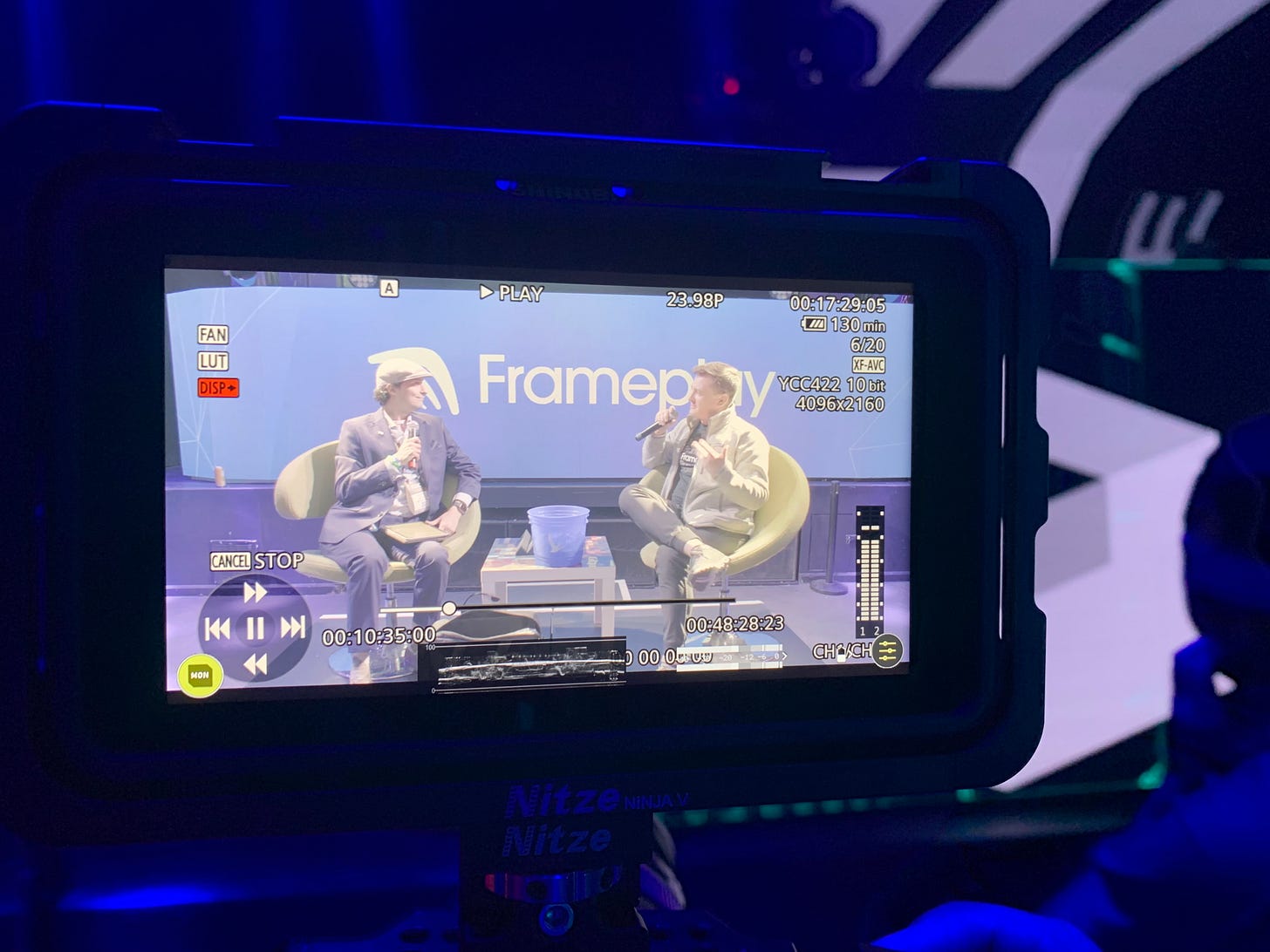Table of Contents
Introduction
Newsletter Updates
Podcast References
Transcript
Footnotes
Introduction
Ahoy, me hearties!
Ok, this bonus issue isn’t as “piratey” as the last one, but it’s still one hell of a haul for the S.S. Game & Word, and I tell you why!
This week, I have another audio interview for you, recorded live at GDC 2022! I spoke with Chris Smith, Metanomic’s chief economist, about how video game economies work. That’s right, “game economist” is a real job. And, as it turns out, quite a fascinating one!
Now, before we begin, I must apologize in advance for the audio. I edited out all the distracting conference background noise, but as a result, parts of our conversation might sound a little stilted. It shouldn’t be too distracting, but if it is, please accept my sincerest apologies. Also, thank you for bearing with me as I slowly get the hang of this whole podcasting thing.
Also, if you want a refresher on Game & Word’s current volume before you listen, here’s the full series on pirates so far:
Issue 1 ● Issue 2 ● Issue 3 ● Bonus 1 ● Issue 4 ● Issue 5 ● Issue 6 ● Issue 7
You can find this week’s podcast references, footnotes, full transcript, and a couple of big updates after the updates section. See you next week!
~Jay
PS—If you really enjoy this newsletter, consider buying me a cup of coffee. Just $5 will fuel one full night of gaming writing. Just click the image below ☕️:
Newsletter Updates
Ok, I’ve got a couple of updates. I’ll start with the biggie: I’m back from GDC (Game Developers Conference)! This means Game & Word will resume its normal publishing schedule, starting now.
Oh, and the conference was a blast! In fact, I have a message for all my new subscribers from GDC:
Welcome to Game & Word!
I hope you enjoy the newsletter. Please feel free to reach out to me any time by replying to this post, dropping a comment, or emailing me at gameandword@substack.com—I love hearing from my readers!
That panel I moderated also went quite well! I haven’t located any video yet, but I did find a picture of a picture of me looking all moderator-like. And no, that wasn’t a typo. Behold:
Well… technically it’s a picture of a frame/screengrab, not another “picture,” per se. But you get the idea.
Anyway, moving on!
In other news, I wrote a guest post for Night Water, an excellent newsletter for the nocturnally-inclined among us, published by writer and veteran podcast producer Adam Cecil (Welcome to Night Vale, Milky Way Underground). Have you ever wondered why gamers seem to be natural insomniacs? Well, I think I’ve cracked the mystery:
So, what did you think? Did I nail it, or was I way off? I’d love to hear your thoughts:
Oh, and if you’re as much of a night owl as I am, I highly recommend subscribing to Night Water. And no, not because I wrote on there (ok, not just because I wrote there). It really is a great newsletter for the naturally nocturnally inclined:
Ok, that’s it for the updates! Podcast references, transcript, and footnotes are below.
Podcast References
Books
Freakonomics by Steven D. Levitt and Stephen J. Dubner
Predictably Irrational by Dan Ariely
Papers and studies published by Ted Castronova
Games
Extras
Follow Chris Smith on:
Transcript
NOTE: This transcript has been lightly edited for clarity.
Game & Word: Hello, everyone! And welcome to another bonus edition of Game and word recorded at GDC 2022 in San Francisco. Today I have with me, Chris Smith, chief economist at Metanomic, a company that automates economics and games. If you want to elaborate on that, Chris, go ahead.
Chris Smith: Yeah. Thanks for having me. So, I'm Chris, I'm the chief economist at Metanomic. What we do is, we consider ourselves the first runtime autonomous economy engine. So what we specialize in is essentially trivializing the amount of time that the game designers spend designing their economy. We tried to take the boring stuff out of game design and handle all the calculations and stuff that they would need to do.
Game & Word: Do you know, on average, how [much time] the designer saves?
Chris Smith: So it depends on the genre and the type of studio, obviously. If you're talking about a giant AAA1 studio you're potentially talking about, I would say two to three man-hours a day for 18 months. If you're talking about a smaller game, maybe an indie,2 you're probably still talking about three to four months of a game designer's time. So we like to think that we've cut out a lot of that.
Game & Word: Gaming economists seem to be a pretty rare breed. I was stuck, I was really struggling to find a source that was knowledgeable in both areas for this piece. How did the path to your current position look like?
Chris Smith: Yeah. My background is actually as a PhD in economics, originally. In my undergrad, I loved video games. So I was trying to study video game economies in an academic setting. And then I ended up going on to do a PhD and I started to study more hardcore economics topics like labor market discrimination, transportation, kind of “classic” econ topics. Well, transportation's not necessarily a classic econ topic… but because of my undergraduate work, I ended up having a guy, the CEO of Metanomic, Theo Priestley, reach out to me just randomly.
And he was like, “hey, do you want to come design a video game economy?” And I was like, oh, that sounds cool enough. So yeah, I'll do some consulting work. What it ended up becoming was Metanomic. We ended up designing on accident, a tool that could be used for any economy, not just a large MMORPG.3 So that's how I got here. I had all the training and, fortunately, the interest to perfectly fit [in] this type of position.
Game & Word: And to what extent do game economies function, I guess for lack of a better term, like “IRL” economies?
Chris Smith: So, that's a really good question. And I think it's going to become a more popular question to be answered in an academic setting.
I know, personally, prominent economists who are interested in studying digital economies, particularly video game economies. So, it obviously depends on the game. In terms of the fundamentals of economics, you think about classics, [the] Law of Supply and Demand. Those are all, we see all of those in these digital economies, which is interesting because we think of digital economies as this free-range, infinite scalability, you can do whatever you want, there's no limit. [But] there are limitations in these digital environments, and they replicate those that we see in the real world. And so that's why we see a similar economic phenomenon in video game environments [as] we would in real life.
Game & Word: An example of that would be, I guess like what we'll call a “bubble.” How often do you see that?
Chris Smith: So bubbles are very common. In the MMORPGs sometimes, though, they're driven by open information speculation. Where people know what's going on, people know why these bubbles are forming whereas in the real world, we don't have anywhere near as much information as we do in video games.
So it's hard for us to know whether something's a bubble or something is actually, that's the real value. That, to me, is one of the great, liberating things about digital economies: it’s the openness of information. There's no longer these hardcore asymmetries of information. So I know if I'm buying this bubble asset or something like that.
Game & Word: Yeah. And what extent do you think that affects the usefulness of looking at digital economies as a way to like better understand or even predict an IRL economy.
Chris Smith: So that was actually one of the reasons I started studying video games when doing undergrad. One of the reasons I was interested was if we can find an environment that is controlled, that is experimental, that replicates human behavior in real life.
Why can't we run an experiment in the digital economy and predict the outcome that would happen? Let's raise the minimum wage. Let's lower interest rates, things like this, that economists are toying with all the time, trying to—and bashing their heads against the wall—run experiments. So that, to me, is the direct application.
Game & Word: Got it. So, in your talk today, you mentioned now a lot of things like labor markets and tech growth was another one. Would you mind giving a quick kind of rundown for our listeners?
Chris Smith: Yeah so my background in my Ph.D. is actually, my dissertation is focused on labor market topics, labor market discrimination, and particularly racial discrimination in the labor force, [and] transportation discrimination. I've looked at the hierarchy, the structure within a firm.
What this comes back to is essentially workers trade off on, “do I want to take Job A, Job B, or, live on unemployment benefits?” Or something like that. These options—Job A, Job B—are exactly, they're analogous to the types of choices that people make in a video game economy.
Do I want to become a lawyer, or do I want to become a banker? Do I want to become a mage or do I want to become, an assassin or something like that? So in that way, those labor market decisions are very similar.
For technological growth, I talked about this in the talk, but, that's what video game economies are: they're the exploration of technological growth to the Nth degree. Power levels, leveling up their statistics, everybody just loves becoming better.
And that's what real economies do. They become better over time. It's just much slower and more boring [than game economies].
Game & Word: What are some interesting times that really illustrate what we're talking about?
Chris Smith: So, I bring this example up all the time. One of the things that I think does a really good job at exploring technological growth is actually Minecraft's economy. You're constantly upgrading your pickaxe to the next level, and then eventually you're enchanting it and stuff like that. So there's, there's this efficiency thing. You're constantly increasing your output by increasing your technological capacity. And yeah… I'll leave it at that.
Game & Word: How can economic theory help people design better video games? Or gaming economies?
Chris Smith: I think that there are two answers to this.
The first one is a philosophical one: using economic intuition to drive your decisions as a game economist. What I mean by that is: you can, if you know about certain economic principles, you should be able to predict what's going to happen.
So I talk to a lot of potential clients that are, they're like "this thing ended up happening." And I'm like "you know that this is the mechanism that caused that?" And they go, "oh!" Or I'll be predictive, and I'll say "the mechanism that you've built here, has an expiration date." And they'll say, "no, it doesn't." I say "there actually is." You wouldn't know it if you didn't know economic theory or at least economic intuition.
That's the philosophical answer. The more technical answer is, just a better understanding of mathematics, a better understanding of algorithmic thinking would really benefit simulating environments and stuff like that. Yeah.
Game & Word: And do… oh, I lost my train of thought. All right. We will come back to it.
What are, so kind of moving away from MMOs or multiplayer sandbox games, say you take a game like Tropico, where it's just a simulated economy, but it's like completely an experiment. In the truest sense of the term. Which games do you think really do it the best?
Chris Smith: Obviously there's like the Civilization, games but in terms of simulating an economy and doing it really well not a lot of games have explored economics as a gameplay mechanic in my opinion.
And I'd be curious to hear if there are games that people can think of. I was speaking with someone today who was interested in running kind of a game where the player is actually the God character or the government who's designing the environment, that little agents behave in to see what the economic outcome is.
So I actually think it's a potentially understudied, underutilized gameplay mechanic. If that makes sense.
Game & Word: Have you ever played Port Royale, any of those [games]?
Chris Smith: I don't think so.
Game & Word: So that's a series of trading simulators set in the pirate age Caribbean. And so a lot of, buy low, sell high, plunder a ship or two on the way.
Chris Smith: So I'm actually, I'm an avid board gamer. I would say that I played, I spent a lot of time on board games. So that's my bread and butter, and board games do a really good job at exploring economic phenomena. This question of, buy low, sell high stuff like that controlling the supply, understanding what is going to happen two turns from now.
So that's where I draw some of my [observations], so I'm always interested in learning about video games that do what a board game does, in a video game setting
Game & Word: Ah, I remember, the question from earlier on! What kind of misconceptions, or maybe faulty assumptions, do you see recurring a lot? Like with, game designers, when trying to design economies?
Chris Smith: Game designers are startlingly good at making video games like or making economies.
Like they don't even know how good they are, actually! That’s my view. But I want to preface this by saying there are some incredibly phenomenal game economists out there, and I don't want to undercut those people, but on average, the mistakes that are made really come down to one thing, and it's not giving yourself control for the future.
You design this mechanism that in theory works, but once it actually gets going, it runs out of control and you have no way to control it. But economists are constantly… they have a thousand levers they can pull when things go awry. So that's, to me, the rookie mistake. If you will.
Game & Word: Got it. So we've been talking about like we could talk about purely, simulated digital economies, you have the MMOs and then you have the quote unquote “IRL” economies. What do you think are some of the most recurring things that they share? And also, like where do they differ in certain key ways?
Chris Smith: I'll start with where they differ, because that's the easier question. They differ in the way that and I was just talking to a guy about this. In real life, it takes you a long time to accrue capital.
It takes me a long time to earn a wage. It takes me a long time to buy a car. All of these things are spread out over a massive—relatively speaking with in terms of my lifespan—amount of time. And, you don't have the luxury as a game designer to spend that much time. So there's this natural sink… sorry, faucet.
The faucet in real life is super slow. It's a trickle in video game economies. The faucet has to be faster in order to keep players engaged. There has to be more reward in the environment.
Game & Word: Just for our listeners, you say the “faucet? “
Chris Smith: Yeah. So a faucet is basically injecting resources, injecting rewards into your environment and how quickly that is.
And then a sink is basically what the players spend that reward on, how do they get rid of those resources? And is that a fun process? So typically we like to make those faucets or the sinks fun. That's the critical thing. So yeah that's what I mean by [faucet]. The big difference is that there's a trickling faucet in real life and flowing faucet in a digital economy.
And then what is similar about them? That goes back to the labor markets, and a technological growth argument that I was making, where there are fully fledged labor markets within video games. And actually this is a research project that I'm considering taking on with one of my mentors.
Really looking at what's the best economic model to study video game economy behavior by the players in the economy. Is it a labor market? Is it a trade market? Is it a clubs market or something like that? And for the listeners, you can Google that. I won't go into that, but yeah.
Game & Word: Speaking of that. Where would you recommend, say if someone's, interested in an economic theory, but maybe feels a bit intimidated by it? Where do you think, or where would you suggest that they start?
Chris Smith: Yeah. So I would say because I have an experimental, sort of an experimental background, I've got to recommend the classics, like Freakonomics, Predictably Irrational. Freakonomics, I forget who [wrote] that I'm a terrible economist for forgetting who that's by, but Predictably Irrational is by Dan Ariely. Those are some “poppy” books. Those are more about human behavior than actual theory, or less focused on theory.
In terms of some cool, oh [economic] literature, Ted Castronova is an awesome economist who in the early, late nineties, early two thousands. He started to really academically look at these digital economies. So that's a really good place to start and his stuff is very accessible.
Game & Word: And I know your specialty is in neoclassical economics. I was wondering what your thoughts are on, say behavioral economics and neuroeconomics, applied towards designing.
Chris Smith: Yeah. I mean that I could talk about that for hours. I actually, I went into the PhD with the intent to become a behavioral economist. I wanted to study these… wanted to use experiments to study anomalous human behavior. Or in terms of the theory, anomalous behavior that to us as neoclassical economists doesn't make any sense.
The beautiful thing about video games, and the thing that the disconnect between video game theory and economic theory, is that video game theory understands the power of lore—the power of storytelling, and the role that plays in the economy. So from a behavioral standpoint, behavioralists are [thus] always trying to measure unmeasurable things or seemingly unmeasurable things.
I wrote a paper in my undergrad, actually, about it. It was a “zero price” paper, and it was basically looking at the cost of something that's free. And I found that I called the cost of something that's free, "the moral cost," the cost of taking it from someone. So there's this feature, this thing that's unmeasurable or not important from an economist, or [rather] a classical economists perspective, but really important and relevant, to a video game designer and to a behavioral economist.
Game & Word: Great. I think that's That's about it for me, for my questions. If you want to, if you have any pluggables you want to plug, now's the time.
Chris Smith: Yeah so definitely obviously check out Metanomic limited. We have a Twitter, we have LinkedIn, we have a website, and we're going to have a new website coming up soon.
So Metanomic, we have an MVP4 coming out in about four months and so we're very excited. Please reach out if you're interested.
Game & Word: All right. Wonderful. All right. Thank you, Chris. And thank you all for listening. If you haven't already, please be sure to subscribe at https://gameandword.substack.com. This is Jay Rooney, recording live from San Francisco. Have a good day.
Footnotes
“AAA” is industry lingo for a big-budget game, developed by a major studio, with correspondingly high production values. Development budgets for AAA games can easily run into the tens of millions of dollars, not including publishing-related costs like distributing and marketing. AAA games are roughly analogous to Hollywood’s big-budget “blockbuster” movies.
While AAA games tend to be the most “polished” in terms of graphics, mechanics, and production values, they tend to stick to proven formulas, due to the publisher’s need to recoup these games’ astronomical development costs. As such, players constantly bemoan the lack of innovation, or even variation, within the AAA space.
An “indie” game, meanwhile, is the exact opposite of a AAA game. Indie games are usually made by small studios, comprised of only a handful of people—or even just one lone developer—with a comparatively minuscule budget. Indie developers often either self-publish their games, or work with smaller publishers specializing in indie titles.
While lacking the polish and high production values of AAA titles, indie games nevertheless radiate a certain ineffable charm and moxie. Indie teams (which can be as small as a single developer)—needing to stand out in a highly saturated market, but working with painfully small budgets—are forced to work more creatively, boldly, and innovatively. As a result, indie games have become some of gaming’s most memorable, beloved, and influential titles. Indie developers form the creative drive that pushes the medium further.
MMORPG stands for “Massively Multiplayer Online Roleplaying Game.” World of Warcraft is perhaps the most famous example.
In this context, MVP stands for “Minimum Viable Product” (not to be confused with “Most Valuable Player”)



















Share this post